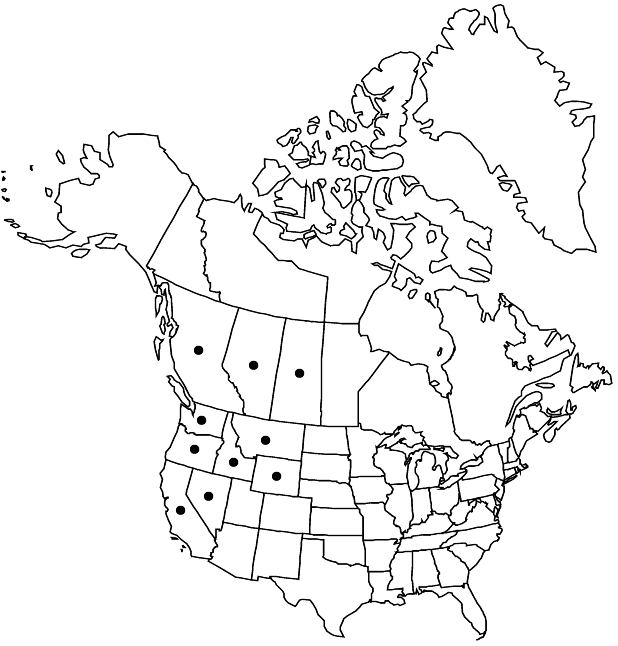Difference between revisions of "Dodecatheon conjugens"
Erythea 3: 40. 1895,.
FNA>Volume Importer |
FNA>Volume Importer |
||
| Line 23: | Line 23: | ||
|distribution=w North America. | |distribution=w North America. | ||
|discussion=<p>Varieties 2 (2 in the flora).</p><!-- | |discussion=<p>Varieties 2 (2 in the flora).</p><!-- | ||
| − | --><p>Both <i>Dodecatheon conjugens</i> and <i>D. poeticum</i> occur in proximity in the Columbia River gorge. Some specimens here assigned to <i></i>var.<i> conjugens</i> may have scattered, minute glands on the pedicels that might indicate past hybridization with <i>D. poeticum</i> (e.g., G. N. Jones 6286, ORE; R. R. Halse 3790, OSC, WTU). <i>Dodecatheon poeticum</i> is densely glandular not only on the pedicels, but also on the calyx and scape. The type of minute glandular puberulence seen on <i></i>var.<i> conjugens</i> found along the Columbia River west of The Dalles is somewhat similar to that seen on <i></i>var.<i> viscidum</i> in western Montana and Canada. Some plants referred here to <i>D. conjugens</i> have slightly connate filaments that may indicate some intergradation with <i>D. pulchellum </i>var.<i> pulchellum</i>. This suggestion is supported by the tendency in the same plants to have narrower leaves.</p><!-- | + | --><p>Both <i>Dodecatheon conjugens</i> and <i>D. poeticum</i> occur in proximity in the Columbia River gorge. Some specimens here assigned to <i></i></i>var.<i><i> conjugens</i> may have scattered, minute glands on the pedicels that might indicate past hybridization with <i>D. poeticum</i> (e.g., G. N. Jones 6286, ORE; R. R. Halse 3790, OSC, WTU). <i>Dodecatheon poeticum</i> is densely glandular not only on the pedicels, but also on the calyx and scape. The type of minute glandular puberulence seen on <i></i></i>var.<i><i> conjugens</i> found along the Columbia River west of The Dalles is somewhat similar to that seen on <i></i></i>var.<i><i> viscidum</i> in western Montana and Canada. Some plants referred here to <i>D. conjugens</i> have slightly connate filaments that may indicate some intergradation with <i>D. pulchellum </i>var.<i> pulchellum</i>. This suggestion is supported by the tendency in the same plants to have narrower leaves.</p><!-- |
--><p>Some newly emerged flowers tend to have connectives that are less rugose than normal. This is particularly true of some populations in southern Alberta and, to a lesser degree, in Saskatchewan.</p> | --><p>Some newly emerged flowers tend to have connectives that are less rugose than normal. This is particularly true of some populations in southern Alberta and, to a lesser degree, in Saskatchewan.</p> | ||
|tables= | |tables= | ||
| Line 59: | Line 59: | ||
|publication year= | |publication year= | ||
|special status= | |special status= | ||
| − | |source xml=https://jpend@bitbucket.org/aafc-mbb/fna-data-curation.git/src/ | + | |source xml=https://jpend@bitbucket.org/aafc-mbb/fna-data-curation.git/src/f6b125a955440c0872999024f038d74684f65921/coarse_grained_fna_xml/V8/V8_549.xml |
|genus=Dodecatheon | |genus=Dodecatheon | ||
|species=Dodecatheon conjugens | |species=Dodecatheon conjugens | ||
Revision as of 21:29, 24 September 2019
Plants 5–30(–40) cm; scape usually glabrous, sometimes glandular-puberulent proximally. Caudices not obvious at anthesis; roots whitish; bulblets absent. Leaves 3–13(–18) × 0.7–2.5(–4) cm; petiole slender (at least proximally); blade narrowly oblanceolate to spatulate or obovate, base usually not decurrent onto stem, usually abruptly tapering to petiole, margins entire, surfaces glabrous or glandular-puberulent. Inflorescences 1–7(–10)-flowered; bracts lanceolate to broadly lanceolate, 3–10 mm, glandular-puberulent. Pedicels 1–5 cm, glabrous or glandular-puberulent. Flowers: calyx light green to yellowish, sometimes finely purple-speckled or -dotted, 5–12 mm, glabrous or glandular-puberulent, tube 2–6 mm, lobes 5, 3–7 mm; corolla tube yellowish with purplish red, thin, wavy ring, lobes 5, usually magenta, sometimes white, 7–25(–35) mm; filaments usually distinct, yellowish or dark maroon, 0.5–1.5 mm, rarely partially connate and tube 0.5–1.5 × 1.5–5 mm; anthers 5–9 mm; pollen sacs usually maroon or yellow, sometimes yellowish and speckled maroon, rarely with reddish purple to purple speckles, connective usually maroon, sometimes yellowish or light blue to whitish, transversely rugose; stigma not enlarged compared to style. Capsules tan, often striped with purple, usually operculate, rarely valvate, cylindric-ovoid, 8–17(–22) × 4–6(–8) mm, glabrous; walls thin, pliable. Seeds without membrane along edges. 2n = 44.
Distribution

w North America.
Discussion
Varieties 2 (2 in the flora).
Both Dodecatheon conjugens and D. poeticum occur in proximity in the Columbia River gorge. Some specimens here assigned to var. conjugens may have scattered, minute glands on the pedicels that might indicate past hybridization with D. poeticum (e.g., G. N. Jones 6286, ORE; R. R. Halse 3790, OSC, WTU). Dodecatheon poeticum is densely glandular not only on the pedicels, but also on the calyx and scape. The type of minute glandular puberulence seen on var. conjugens found along the Columbia River west of The Dalles is somewhat similar to that seen on var. viscidum in western Montana and Canada. Some plants referred here to D. conjugens have slightly connate filaments that may indicate some intergradation with D. pulchellum var. pulchellum. This suggestion is supported by the tendency in the same plants to have narrower leaves.
Some newly emerged flowers tend to have connectives that are less rugose than normal. This is particularly true of some populations in southern Alberta and, to a lesser degree, in Saskatchewan.
Selected References
None.
Key
| 1 | Leaf blades, scapes, and pedicels glabrous. | Dodecatheon conjugens var. conjugens |
| 1 | Leaf blades, scapes proximally, and pedicels usually glandular-puberulent. | Dodecatheon conjugens var. viscidum |